The Best and Worst Anime of Summer 2021
by The Anime News Network Editorial Team,

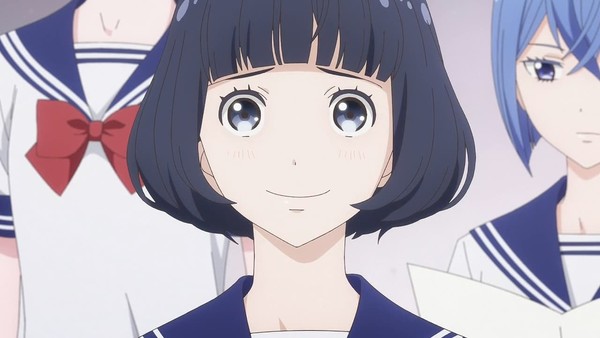
Kageki Shoujo!! is an uneven anime overall, which makes sense given that the bulk of its episodes are character vignettes. But its best episodes are wonderful, perfectly balancing humor and drama in their empathetic depictions of teenage girl problems. The cutthroat performance arts school makes the setting stand out among the crowd of high school dramas. It's also distinctive because of its rich supporting cast of men and women of different ages; the variety of relationships gives the main girls a feeling of emotional reality that's rare to see in anime. And because the series is frank in its depictions of negative emotions and personal sacrifices in the pursuit of one's dreams, the uplifting scenes are especially cathartic. I won't lie—I got teary-eyed a few times watching this.
Runner-up: Love Live! Superstar!!
Sometimes, simple is better. With its sprawling cast of almost identical-looking anime girls, Love Live! has become an increasingly inaccessible franchise for people who aren't into the live eventing and voice actor scenes, so I appreciate how Superstar!! has a down-to-earth focus and smaller, tight-knit cast. Every frame of this anime is filled with lavish detail and charm, and the comic timing is absolutely impeccable. Having skipped the Nijigasaki anime entirely, I thought I was out of the Love Live! fold for good, but Superstar!! is a refinement of the charms that made the original anime a breakout hit to begin with. It's simply a good anime, first and foremost.
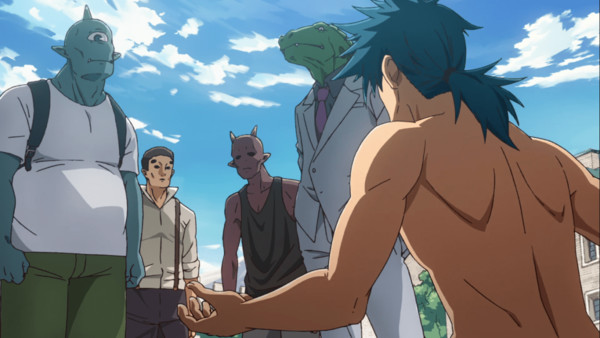
I regret every minute of this anime that I watched. The setup is mildly amusing, but I found myself quickly getting tired of the repetitive jokes and flavorless characters. For a series that revolves around a hell job in a bureaucratized fantasy world, the observational humor is shallow and the characters are so unlikable that I found myself simply feeling apathetic about everything they're subjected to. Aside from some scattered jokes that are funnier in description than they are in context, this was a completely forgettable show.

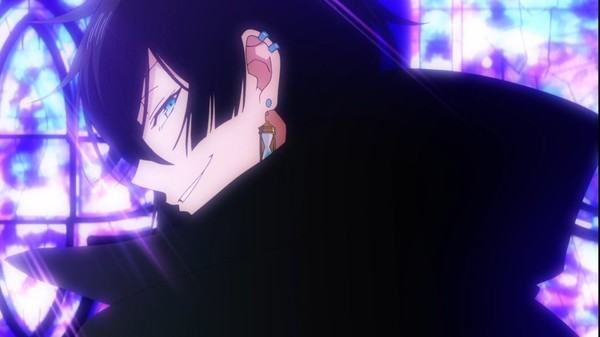
Having only lukewarm feelings for Pandora Hearts, Jun Mochizuki's previous series, I didn't go into The Case Study of Vanitas with particularly high hopes, something compounded by the fact that I'm not necessarily a fan of vampires, either. That means that I was pretty well blown away by the series, which blends good storytelling, impressive world-building, and a cast of interesting characters with a surprisingly high level of historical fidelity. Even when the show lets us know that it's working with an alternate history from our own, it pays attention where it matters, such as when Vanitas remarks to Jeanne that the Sun Tower was built for the 1889 World's Fair. It wasn't in our world, but it was one of the competing designs that ultimately lost out to the Eiffel Tower, and the anime's version of it looks remarkably like the original designs. And yes, costume nerd that I am, I love that the clothes are not only largely period-correct, but also that someone understood that women wore many pounds and acres of undergarments beneath their bustled gowns. There are also an impressive number of literary references, with the most obvious being the fairy tale “Little Red Riding Hood,” which is directly alluded to in the imagery of several episodes, most specifically those involving curse-bearers. But there's also a character lifted from John Polidori's (cult) classic vampire novel The Vampyre and another from H. G. Wells' The Island of Dr. Moreau. The whole thing is a beautiful amalgamation of history, literature, and anime storytelling.
But more important than that is the way that everything comes together – and the fact that it doesn't spend too little time on each plot point. From the introduction of the world's vampire mythology to the fact that Vanitas appears to be on an increasingly mysterious self-assigned mission to save them from the curses cast upon them by shady organization Charlatan, things progress at a smooth pace, dropping bits and pieces of backstory into the main plot with finesse.
Everything comes together sooner rather than later, while still giving us the feeling that the major answers are yet to come, and that is an excellent recipe to keep people coming back. The interplay between main characters Vanitas and Noé is certainly a draw as well, and not just because you could easily look at it with your fujoshi glasses on; they grow together and apart based on what Vanitas is and isn't revealing to his de facto partner, and that feels both ominous and natural. Also good is the fact that they aren't the only two interesting characters or whose interactions hold any depth; all of the players serve the greater plot and how they fit into the story is important, whether they at first come off as a joke (Domi with her rose-spewing automaton) or as a throwaway (Roland).
If you didn't watch The Case Study of Vanitas this season, you have time to catch up before the second cour arrives in January. Even if vampires aren't your thing, even if you couldn't care less about late 19th century Paris, it really is worth it. The story more than stands on its own, and that the art is beautiful doesn't hurt either.
Runners-Up: Welcome to Demon School, Iruma-kun Season Two and IDOLiSH7 Third Beat!
I honestly could not choose one over the other with these two, different though they are. It is interesting that they're both successful continuations of longer franchises, because we often hear that sequels rarely live up to their predecessors. And yes, there are moments in each that don't quite hold up, but by and large those are rare as both continue to build on what they've done before.
In the case of IDOLiSH7, that's continuing to examine who the characters are. We've seen that to a degree with every new season of the franchise, but this time feels like its character development has much more of an impact on the show's world in general. Certainly learning the truth about Yamato's family is major, even in a series where “family” (in the biological sense) is always a fraught term. But going outside of the main idol group to explore what's going on with Re:Vale is important, because at this point all three of the main groups are inextricably intertwined. That Banri was Yuki's original partner is important because of his current job, but it also gives us insight into who Banri, Yuki, and Momo all are as people and how that affects their relationships with each other and with the IDOLiSH boys. I love that there aren't any shortcuts taken with this, either – it would have been easy to show teenage Yuki as nothing more than tactless and disaffected, but to then show that that's just the front he puts up to hide his anxiety is the step farther that makes this franchise a cut above other male idol shows. This is a much more angsty season for the candy-colored singers, but it is worth it to see their journey taken seriously in a way idol shows often gloss over.
Iruma-kun, meanwhile, continues to just be an amazing amount of fun, although it's definitely not without its important plot developments as well. Yes, one of those is the return of Kiriwo, which may disappoint some people, but others include the addition of Alicred, the personification of Iruma's magic ring, and actual good teacher Balam-sensei, who is thrilled to find out that Iruma's a real live human. Balam makes for a nice juxtaposition with Kalego, who, it turns out, isn't an awful teacher – he's just an awful person. He and Kalego were buddies back when they were in school, and seeing Kalego interact with other adults does give us more of a sense of him as more than just the surly Misfit Class teacher. (And his fear of Opera is amazing.) Mostly, though, the second season continues to firm up Iruma's role and relationships in the Netherworld. This includes Alicred working to make sure that most people believe that Iruma's a demon (his simulated evil cycle is pretty wonderful), but it's also Iruma just being his loveable human self and seeing how that has an impact on the people around him. Ameri's raging crush on him is a good example of this as they slowly grow closer (and their date is one of the cutest things I've seen), but even his relationships with the rest of his classmates makes a difference. Iruma gives the rest of the Misfit Class a sense of worth that they were lacking, and that allows us to get to know them better as well – there are no throwaway characters here. The reveal at the end of the season that Sullivan may have an ulterior motive – but is still the world's most doting granddad – gives us more insight into why Iruma's relationships are so important, making this a series that's not only funny, but also knows precisely why it's doing everything in service of its end goal.
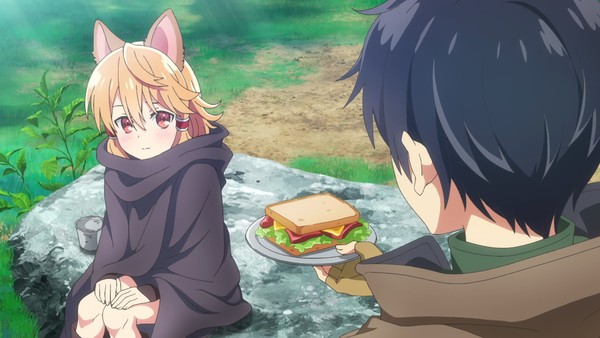
I didn't watch anything truly bad this season, possibly due to the sheer number of shows I was doing streaming reviews for. So that leaves me with the series that just wasn't as good as I wanted it to be: Seirei Gensouki. I know that at this point any isekai series carries diminished expectations for a lot of people, but this one did seem like it was set to do some interesting and potentially different things with the genre – that protagonist Rio's personality was completely separate from his original life as Haruto is definitely one of them, and there seemed to be a large number of people from the same horrific bus/train accident who were all brought to corners of the fantasy world at the same time. Sure, Rio turned out pretty quickly to be intensely over-powered, and yes, he got a low-rent Kirito coat, but there was promise.
Ultimately, however, Seirei Gensouki was not able to live up to that. Mostly that's because the series just ripped through its source material – a series of light novels currently being released both physically and digitally by J-Novel Club – without taking the time to develop anything or anyone. It was impossible to keep track of what Rio was learning, who he was meeting, or why any of them liked him, much less how much time was passing because of the sheer speed with which each episode dashed through the books. Characters were flattened, places reduced to names on a map, and motivations basically went out the window. It went from “interesting story” to “notes scrawled in crayon on construction paper” very quickly, and essentially what we were left with was an adaptation that shot itself in the foot. It's an exercise in squandered potential.
Oh well. At least I can read the books to see how the story was supposed to be. Wait, did I just fall into the anime's trap?

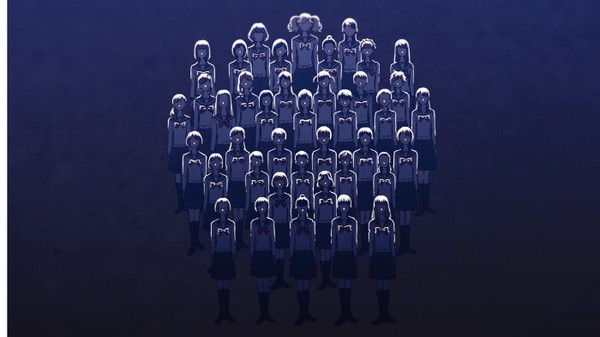
There's been a somewhat memetic repeated refrain that this summer 2021 anime season has been thin or lacking for shows to watch. While it definitely has trouble feeling as full as the gangbusters spring season (and really, how could it not?), it's not necessarily true that there's been a dearth of shows to tune into. Including all the returning franchises, I found myself with plenty to keep up on, and the one that rose to be the top star was a somewhat surprising newcomer in anime format. Well, it probably shouldn't have been that surprising; I was a dyed-in-the-wool theater kid in high school, so even if I wasn't as cutthroat about it as the girls of Kageki Shoujo, their efforts still appeal to me. From the self-doubt of questioning whether you should try out for 'bigger' roles to trying to find your own interpretive performance of something as well-worn as Shakespeare, there's a lot that goes on with the students of Kouka to immediately latch onto from that perspective.
But the breadth of topics related to nascent show-business covered by Kageki Shoujo means it can also get into some harrowing content that I can only be thankful I've never personally experienced. What I find so impressively compelling about the show's presentation of subjects like eating disorders or child sexual abuse is how it never felt voyeuristic; there was little sense of overt trauma-porn in its depiction of these elements. Instead the writing is frank and pointed about these seedier issues that affect these aspirational performers, and sees them overcoming those problems as best as they can in ways that propel us to root for them overall. Anyone who's attempted acting knows that your own experiences – and your own interpretation of those, good or bad – are something you take up with you on stage, and Kageki Shoujo's main appeal, for me, is the way it blends the worlds of real life and performance. These issues they work through aren't singularly for our entertainment – they're there as experiences the girls make their own in the performances we ultimately see. That makes the series a densely effective depiction of the medium of acting, and that's why I found myself engrossed in it.
Runner-Up: The Aquatope on White Sand
As I said, there really wasn't a shortage of shows in this solid little season, to the point that picking a second-favorite was harder than I expected. Do I go with Love Live!! Superstar, which I'm having a perfectly fun time with, or Sonny Boy, which prompts from me such serious respect for the efforts of Shingo Natsume? In the end, I've got to go with my gut, and you can call it recency bias, but upon watching the twelfth episode of The Aquatope on White Sand, my gut was soundly checked by the effectiveness of that one's expertly-executed melancholy. It's definitely funny that I get to invoke my appreciation for accomplished 'endings' in fiction in regards to what is pointedly only the halfway point of the story, but the feeling of finality around Gama Gama Aquarium's closure in this episode strikes those somber, bittersweet notes that I'll always be down for. As much as I overall appreciated Aquatope's tone and concept, it's been something of an uneven ride in its first half here. But if this mid-season finale proved anything to me, it's that the show oughta be able to stick the landing when it really counts. And with the initial premise of the series so emotionally upended, I'm now intensely curious to see where it's going to go for the rest of its run.
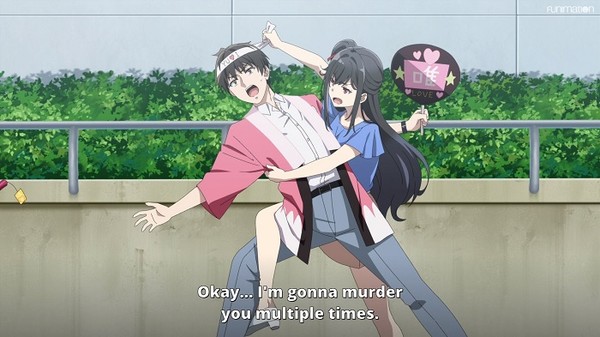
I don't know what I did to you people. I've been coming out here for years, giving you my earnest advisories on anime good and bad, and the reward you give me for all my hard work in the criticism mines is to vote in some of the absolute bottom-of-the-barrel-est shows for me to be assigned to review this season. It's to the point where I felt like three-quarters of my docket were in constant competition these past few months to see who would 'earn' this perennial dishonor. Sure, Battle Game in 5 Seconds was a mess of a production with writing not nearly clever enough to prop up its particular brand of story, but that's just 'normal' bad compared to the other stuff I dealt with. What do I even do with a series like Peach Boy Riverside? That show might have at least been mediocre under optimal conditions, but made the baffling decision to shuffle its episode airing schedule into what was, near as I can tell, the worst possible order to experience that story in.
But no, my opinion of the worst anime of Summer 2021 has me standing in solidarity with the similarly disappointed fanbase of The Detective Is Already Dead. I could criticize the writing at the core of this series, but as the anime wore on it became harder to definitively lay any blame on the show's source text, as it became clear the anime crew had no idea what to do with anything they'd been handed in the first place. Events are shuffled and shown out of order and major characters have their introductions and roles glossed over. Don't get me wrong, huge points of the core plot here are hot nonsense, especially the culmination of the story around the titular death of the detective herself. But regardless of their own inherent issues, popular things are often popular for a reason, so it's arguable that a competent crew could have calculated the proper presentational points to latch onto to make this kind of ridiculous anime adventure work. But they were clearly out of their depths from the beginning, and so any hope for the detective was already dead.

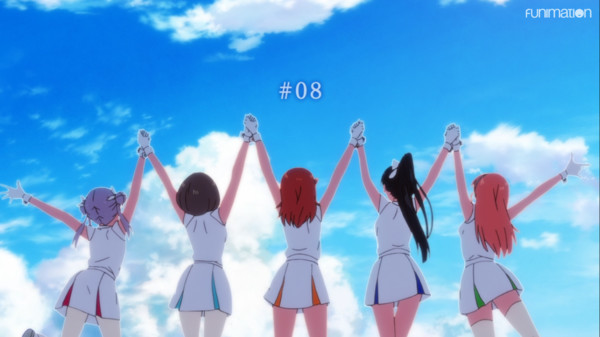
Some seasons, choosing a top pick takes a lot of deliberation. Other times, the answer is so obvious I'd have to be blind-folded at the bottom of an empty well not to spot it immediately. Such is the case with the latest iteration of Love Live! here. Now I'm technically tempting fate, since broadcast delays mean there's a whole third of the series left to go, and it could potentially fall off in its final storylines. But even if that unlikely event occurs, the episodes I have seen have delivered top-shelf animated comedy from tip to toe and left basically everything else I followed this season in the dust. The highlight of every Monday night these past months has been loading up a new episode and just soaking in the sharply written gags, lush direction, and all-around infectious earnestness that only this franchise can deliver. I've laughed, cried, tapped my toe, and just all-around had an unstoppably good time with Superstar in a way that nothing else airing right now can compare with. It's been a truly invaluable source of joy this season, easily in the running for best Love Live entry to date, and that's no small achievement in my book.
Runner-Up: My Hero Academia Season 5
This season of MHA has definitely been divisive. Being produced entirely in the midst of the pandemic meant a lot of compromises in its overall animation production. A large and important section of the story was rearranged, forcing fans to wait even longer to see one of the most anticipated arcs in the whole series in motion. But for all its stumbling, the one place this season never faltered was in its character writing, the element that has made MHA a favorite of mine for years. If anything, that aspect has upped the ante in the back half of the season, delivering a nuanced, complicated, and shockingly mature exploration of familial trauma before diving into a smorgasbord of ambitious character studies with its major villains.
The series has delved into dark and heavy topics before, but with its two most recent arcs it feels like MHA has taken off its training wheels. The story is steering headlong into those elements, venturing into topics I'd always hoped it would and executing on them with appreciable thoughtfulness that's managed to turn its goofiest side characters into flawed, deeply relatable humans. That is more than enough to overcome any pacing or animation faults for me.
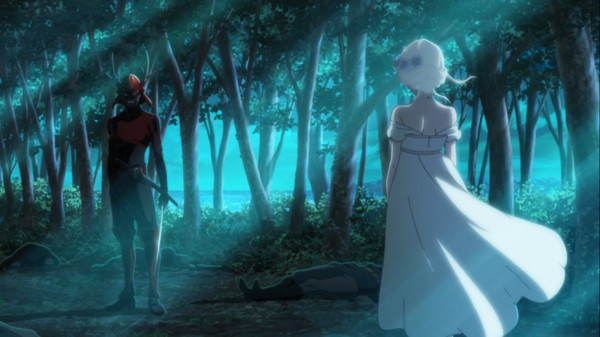
Not gonna lie, for a while I was considering the back half of Tokyo Revengers for the summer booby prize, just for how poorly presented and dull it was for weeks on end. But that show managed to pull out of its nosedive at the last second to deliver a great cliffhanger finale that pulled me back in. So instead the “winner” for me is Fena and her not-so-swashbuckling adventures. Which isn't to say this show is terrible – rather it's just routinely disappointing in how it seems totally unwilling or unable to embrace the fun and excitement of its own premise. This is a show that always feels like it's just a couple of key steps from being a rip-roaring adventure, but constantly shies away from really committing. Toss in a shallow, cookie cutter supporting cast with a lead who feels increasingly adrift in her own hero's journey, and you get a show with gorgeous landscapes and extremely narrow narrative horizons. There's still a few episodes left as of writing this, but it would take an extreme hard turn to make this feel like more than wasted potential. Mediocrity is perhaps a lesser sin than being outright awful, but for my money spoiling a golden setup with unimaginative storytelling is a much graver transgression, worthy of walking the plank.

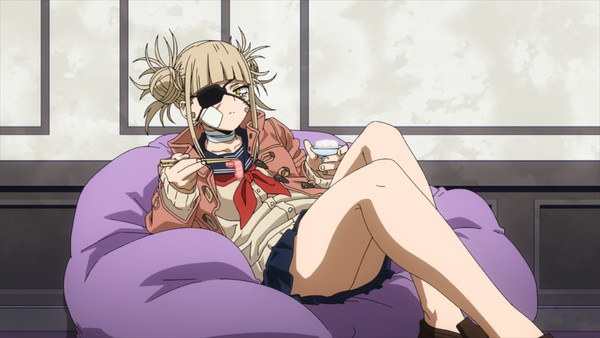
On last season's version of this list, I had My Hero Academia as the most disappointing anime of the season—but I'll be damned if the second cour of the season didn't return the show to excellence. The first half of the cour is focused on something I've never seen before in anime: a deep look at a once horribly abusive man trying to mend the family he broke. On one hand, we have this person who, despite becoming the world's greatest hero, traumatized his children, pushed one of them into an early grave, and gave his wife a mental breakdown—without even realizing that he had done anything wrong for years. Now, he sees the horrible damage he has done but is left with an impossible question: can the unforgivable find forgiveness? And credit to the show, it doesn't shy away from giving the hard answers.
The back-half of the cour, on the other hand, gives us something long overdue: development for our recurring villains. While we've known bits and pieces about them, this entire arc is a breakdown of each one's past and motivations for joining an anarchic group like the League of Villains. Each episode basically focuses on one individual villain as they attempt to survive in a city of super-powered humans out to kill them. It also uses this as an opportunity to power up our villains and keep them as a legitimate threat to our ever-growing class of heroes. All in all, it makes the villains seem both dangerous and human by showing how they were not simply born villains but were molded into becoming them.
Runner-up: Magia Record: Puella Magi Madoka Magica Side Story (Season 2)
The second season of Magia Record does so much right. It looks great and moves the story forward at a good clip (as opposed to the often-meandering first season). We also get the direct inclusion of both Homura and Madoka in the tale, showing a vastly different way their story could have gone while adding a massive amount of additional emotional weight for fans of the franchise.
But the best part of the anime is the wide cast of characters themselves. In so many anime, the heroes are united in purpose and often follow one central figure who makes all the big decisions. The characters in Magia Record, on the other hand, all have their own unique goals and motivations, making them feel more like real, complex people. And from a story sense, this means that every character is both a potential ally and potential enemy, depending on the situation. They also have unique pasts and traumas—meaning each has a breaking point which could destroy them emotionally. It all adds a whole extra level of tension as each revelation comes to light and the characters are forced to rethink their choices, philosophies, and the sides they are on.

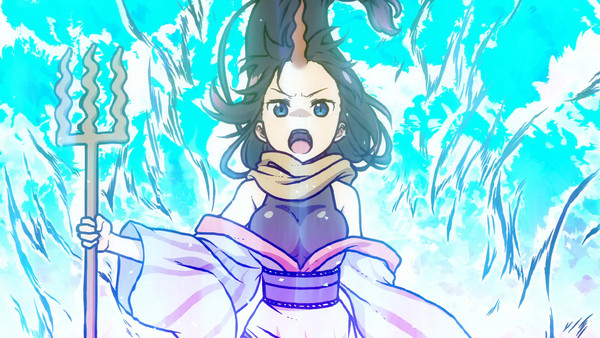
Best: Miss Kobayashi's Dragon Maid
Admittedly, this was a weak season for me. There were a handful of shows I followed but I've fallen off a lot of them in the last few weeks. This isn't because they aren't good. In fact, most are listed above in our team's "best" picks. It's just that none of them gripped me enough to become "must watch" viewing and I found myself waiting two to three weeks and watching it chunks instead. In other words, a lot of great shows but nothing that I found exceptionally compelling. Yet, leave it to the big tiddy dragon show wallop me in my own feelings nearly every week.
This was a show that was always going to pull out a lot of emotions from its audience just by the circumstances in which it was created. It's the first new television anime to come from a beloved studio following an unprecedented tragedy. While I'm sure many of us would have been considerate if the show didn't meet the previous season's highs, Kyoto Animation nonetheless exceeded that benchmark to deliver a gorgeously detailed show every week. The introduction of Ilulu may have raised eyebrows, but by the end of the season I had warmed up to her as a worthwhile addition to the cast. The story's renewed focus on its secondary cast was a welcome change and the emotional showdown between Tohru and Elma is likely to be one of the year's anime highlights.
Runner-up: The Case Study of Vanitas
Can I vote for this just because I appreciated its sexual energy? The Case Study of Vanitas checks all my specific boxes: absolute disaster lead character, fancy turn of the century fashion, a woman referred to as "Dom," love-hate sexual tension, gore, and a grumpy cat. Some of the capital-N Nouns are a bit much and the overall plot has gotten a bit convoluted for me to keep track of (in other words, make sure you're paying attention), but I'm always having a good time with the show and am glad there will be more of it come January. Also worth a mention is Sonny Boy, a show I fell off of because it got really esoteric but absolutely will finish this weekend.
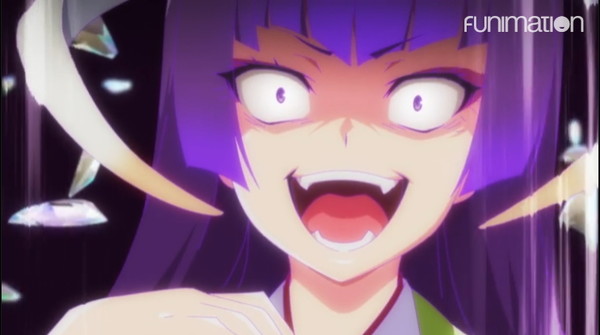
Hey, look, it's the other show I reviewed this season. Man, where do I start with GOU-SOTSU? This show's failure is primarily due to its inability to validate its own existence. Initially marketed as a remake, GOU-SOTSU is in fact a sequel with a germ of an idea that never gave rise to anything interesting. The crux of its conflict is resentment between two characters who want different things from life but refuse to part with one another. There are some decent slasher moments, but it never should have followed the format of Higurashi's Question and Answer arcs. The answer portions (SOTSU) devolved into months of recap with few revelations to justify it and shallow mysteries. The final episode (which airs this week) may very well resolve the primary conflict, but at this point I don't really care if the now superpowered BFFs get back together or not.

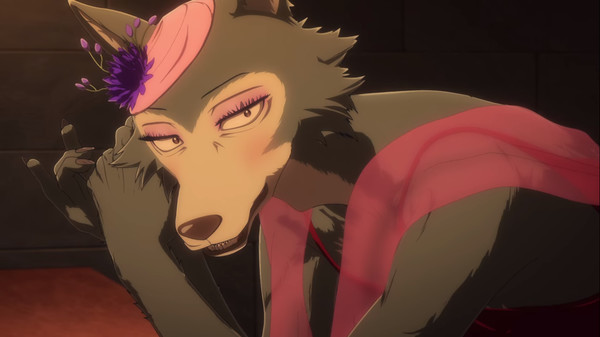
Let's get this out of the way up front: No, the second season of Studio Orange's BEASTARS adaptation isn't as good as the first. A lot of this has to do with the inherent flaws of Paru Itagaki's source material, as even diehard manga fans like myself tend to agree that the series gets worse as it goes along. For as delightful as its furry soap-opera antics can be, the sprawling and often unfocused saga of BEASTARS is never able to top the near perfect balance of allegory and bat-shit insanity that it managed in its early story arcs. Haru gets less and less screen time, and the “murder mystery” angle never amounts to much of a mystery, even as Legoshi descends further into his neurotic obsession with herbivore animals' “purity”. That said, even lesser BEASTARS is something to behold, and there still isn't anything else like it on TV.
Nearly every episode of this sophomore season is stuffed to the gills with the franchise's signature blend of neo-noir melodrama and brazen sexual hijinks, all of which is perpetuated by a cast of impossibly weird teenaged furries. While Legoshi plays Wolf Batman on behalf of his maybe-or-maybe-not rabbit girlfriend, Louis the deer becomes the underage Don of the lion mafia, and that's just where the season begins. Naturally, none of this insanity would work if Orange weren't the industry leader in blending together traditional and computer-generated animation, so even when the scripts get wobbly, BEASTARS is always a treat to look at. If ODDTAXI was the Zootopia/Coen Brothers mashup that we never knew we needed, then BEASTARS' second season is what would happen if you took CW's Riverdale and shoved it into a Cronenberg teleportation pod with a bunch of kinky Zootopia fanfiction. In other words, the obvious choice for best anime of the season.
Runner-up: Magia Record: Puella Magi Madoka Magica Side Story (Season 2)
I reviewed the first season of this Madoka Magica spinoff back in 2020, and even if the COVID pandemic that hit immediately after it ended hadn't completely destroyed our collective ability to form tangible long-term memories, I would have had a hard time telling you what Magia Record was even about. “Something something Rumours” and “yadda yadda Connect powers yadda” is about all I could have managed when the summer began, though I might have remembered the inexplicably tiny Kyubey if you put my feet to the fire. Then, as if specifically to make me eat my words, the first four episodes of Magia Record Season 2 proceeded to kick an unholy amount of ass. The storytelling was tighter and more comprehensible than ever before; I was actually able to get emotionally invested in the adventures of Yachiyo “Not Homura” Nanami and Iroha “Definitely Not Madoka” Tamaki; and did I mentioned that nearly every single action scene between these new Magical Girls is unbelievably gorgeous? There are glow-ups, and then there is whatever the hell SHAFT is up to with Magia Record this year.
Granted, at least one of this season's eight episodes was an unmitigated disaster, but even that embarrassing pratfall wasn't enough to stymie the show's comeback. The jury's still out on the upcoming season finale, but I'm officially a fan of Magia Record now, and that alone is an accomplishment worthy of winning this season's runner-up spot.
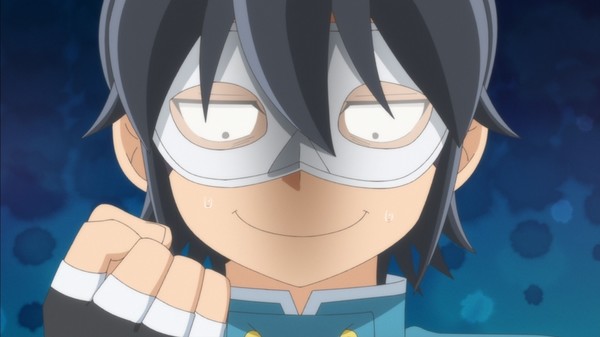
I wanted to love Tsukimichi so much, and for the first 5/6ths of its inaugural season, I mostly liked it, at the very least. Nobody on Earth will be surprised to hear that I'm no isekai fan, but the Misadventures of Makoto McHeroGuy and His Monster Maidens had a lot of charm to spare in its early days. Tomoe the Dragon Weeb is an utter delight, Mio the Spider Bride is adorable in her own right, and I appreciated how Makoto's adventures offered some subtle subversions of stale isekai tropes, while still managing to be a decent comedy anime.
However, as the season went on, Tsukimichi's desire to become a generic isekai power trip became more apparent, and its sloppy characterization and world-building started to buckle under the weight of its mediocre ambitions. This all culminated in its penultimate episode, “Goodbye”, which takes such an ill-advised swerve into the territory of gory, edgelord nonsense that it practically ruined the entire show for me. I'll still watch Tsukimichi if I get assigned the second season in the future, but whatever hopes I had for Makoto's tale at the start have been well and truly dashed.

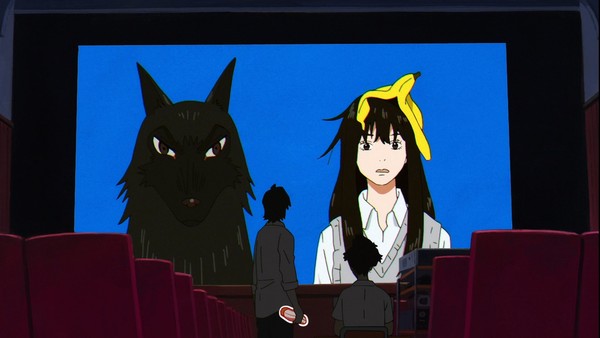
Best: Sonny Boy
What is there to say about Sonny Boy? It's the rare anime that feels legitimately experimental—not necessarily in its application of technique (although there are certainly moments that dazzle), but in its willingness to eschew conventions and structure in its pursuit of scholarly cultural magnifying glasses. I'd be tempted to call it improvisational if not for Shingo Natsume's consistent and distinct creative vision, which suffuses each sweaty and overstuffed pore of the series' fresh take on adolescence.
Every week, reviewing Sonny Boy has felt like an excavation. I'm deep in a mine, digging out these weird lumps covered in mud and stone, turning them around in my hands, and carefully washing and chiseling my way towards something recognizable. It's been challenging, with the sense of reward that comes with a good challenge. But I don't mean to make the series sound intimidating! While I called it impenetrable earlier on in the season (and I might have even repeated that sentiment more recently), I don't think that's the right way to look at the way Sonny Boy's story, characters, and themes intersect. Yes, the presentation of the story is too obtuse and clever for its own good, the characterization suffers from the overall flat affect of the writing, and the themes are somehow both too grand and too granular to pin down. However, all of these elements combine in a very specific way that makes Sonny Boy kick ass.
Sonny Boy is probably best described as an anime Rorschach test. Its embrace of abstraction and appetite for new philosophies mean that each viewer is likely to have not just different, but very different interpretations of its symbols and discourse. It can stumble into hot water as easily as it can transcend it. That can be exhilarating or frustrating, depending on your perspective, but I think it's a wonderful combination of both. For an anime that purports to examine big questions about humanity and our place in the universe, the best approach—perhaps the only approach—is to be as messy and varied as human history. I've seen smarter anime, and I've seen more avant-garde anime, but few anime can claim to be as fascinating as Sonny Boy.
Runner-up: Love Live! Superstar!!
On the complete opposite end of the intellectual spectrum, Love Live! Superstar!! has been a consistent (though not as consistent as I'd like, thanks to the Olympics) source of good dumb fun about a troupe of idiots dreaming of school idoldom. I've probably appreciated it all the more because Sonny Boy has been so adamant about frying my brain each week. Superstar!! is like a nice and cool compress that lets me chill out with funny faces and bubbly pop interludes.
Speaking as a Love Live veteran, I also have to venerate Superstar!! for possibly being my favorite iteration of the franchise to date. They might have halved the squad size, but this bite-sized version of Love Live makes for a leaner and snappier dose of school idol goofs. Bear in mind my only concern is the anime, so I have no idea if there are any repercussions on the music or fandom side. For my money, though, all the girls are good, and I've gotten plenty of kicks out of the way their personalities bounce off each other. However, I must provide a very special shout-out to best girl Sumire, who earns the coveted title of Queen Gremlin in the Superstar!! universe.
The return of OG Love Live director Takahiko Kyogoku has been a very noticeable boon for Superstar!! as well. He possesses a keen sense for the right balance of comedy and sentimentality that makes Love Live feel like Love Live. In a world where someone like Honoka can control the currents of both weather and time, I appreciate it when the franchise doesn't take itself too seriously and leans consciously into the overblown emotions and stakes of musical theater. And on the subject of music, I've loved all of the concerts so far. The gap between these dynamic rainbow-hued dance extravaganzas and the weird puppet shows from season one is hilariously huge. Anime CGI has come a long way, but Love Live is still doing what Love Live does best, and it's doing it better than ever.
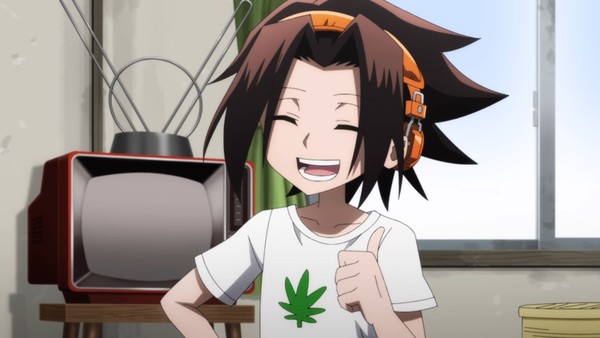
Truth be told, I didn't have a bad time with Shaman King, but of the anime I watched this season, it's the one that suffered the most from choices made in its adaptation and distribution. To speak on the latter issue first, I just don't believe the Netflix model jives particularly well with long-running shonen series. Releasing 12-13 episodes at a time every few months just seems tailored to kill both momentum and discussion. Obviously this becomes a non-issue once the full series is streaming, but since we're talking about seasonal anime here, I'm looking at it in terms of seasonal distribution. This first chunk of episodes, for instance, ends unceremoniously in the early stages of an arc. It's not a cliffhanger. It's just an awkward pause, and audiences are left waiting until Netflix decides to resume the videotape and drop the next chunk, which will likely end similarly. It's a frustrating way to handle multi-cours shows, to say nothing of the other disadvantages of Netflix Jail, so I'm glad they're moving in the direction of weekly distribution next season.
Onto the content of Shaman King itself, because I have no nostalgia for either the manga or the old anime, I can only approach this reboot as its own thing. And, again, while it's definitely not bad, I'm not the biggest shonen guy to begin with, and Shaman King doesn't do a whole lot to meaningfully differentiate itself from the crowd. It's at its best when it leans hard into the macabre—a villain vivisecting the hero's best friend right in front of him makes for a bizarre and skin-crawling scene—but those moments are too infrequent to sustain the entirety of these opening acts. I wish the ghost battles were as cool in execution as they are in concept, and I wish the show didn't feel so rushed. I understand that's a consequence of the reboot's accelerated pace, and normally I wouldn't complain about this kind of series trimming its fat, but it hurts this introductory phase where we're supposed to get to know and like these characters.
Shaman King definitely has its charms, and I know I'd feel differently if I grew up with the series, but I can't say this reboot has done much to convince this outsider to stick around.

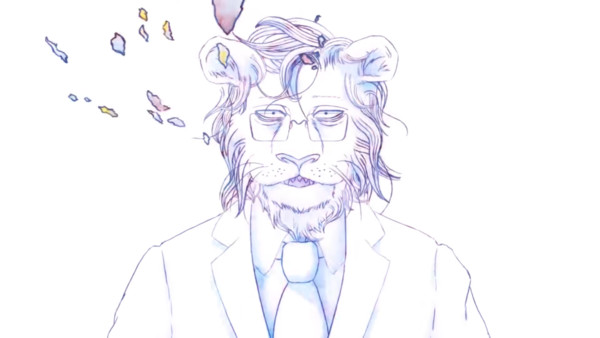
Best: Beastars Season 2
It's that time again. The time where I put on a big T-shirt that says “I'm Not a Furry BUT-” so I can unabashedly gush about Beastars while people keep asking me questions already answered by my shirt. You don't need to be part of a certain fandom to understand this series appeal. The characters lurking the halls of Cherryton Academy may not be humans, but they certainly know how to act like ones. All the world's a stage and all herbivores and carnivores are merely players.
Previously, Studio Orange blew my high expectations out of the water in the first season of this innovative CG adaptation of one of my favorite manga. Almost a little TOO good! I immediately wondered how the second one would pan out as the story experiences some growing pains as it expands on the truth behind the murder mystery and the maturity of our dual protagonists, Louis and Legoshi. But once again, it delivers this tale of tails almost effortlessly. As a performance, this second season is equally graceful and provocative as the first as our resident drama nerds step out of the spotlight and sink into the darkness that lay beneath their once pristine days of youth. Emotionally, it's incredibly visceral but also maintains the same level of heart and sincerity that charmed me to begin with, despite the darker turns. I've also seen lots of people talk about how they can't really fathom what Beastars is trying to be about, but for me it's enough to see these characters cope with existence in an unfair world and be allowed to feel it fully. It's a raw experience, but like the time Legoshi eats bug and trips out, it goes down smooth. That's why Beastars Season 2 was an anime that left me feeling totally satisfied.
At least, until I get hungry again!
Runner-up: The Case Study of Vanitas
Now for something that wasn't in Netflix Jail! If you thought Beastars was heavy on the horniness and intense bisexuality on display, Studio Bone's latest The Case Study of Vanitas might give you a fatal case of the vapors. If Vanitas is a case study of anything, it might as well be in how anime should display on-screen sensuality. While the concept of “vampires” and “sexy” are basically synonymous, most other anime don't have the audacity to allow their characters be half as lewd while still maintaining their impeccable Victorian dresses.
But dear reader, doing sexy is not the same as being sexy, and every character in Vanitas is as sexy as they are emotional disasters, which is to say they all carry enough damage to level two- dimensions of Paris, individually. And that's the kind of excellent character work that won me over. One of the hallmarks of a great anime is that the cast, by itself, is entertaining; I could spend hours just listening to the characters banter with each other because they've all got such compelling personalities portrayed in such a loveable fashion. The direction leans in on this with its snappy pacing, heavy amounts of fluid little super-deformed versions of the characters, and overall flourish that extends not only to the little moments but also the plot and the action. The parade of blood and sparkles makes this the most polished looking anime of the season. The only thing sort of hampering it right now is that it's only half the season and part of a larger story, and because of that I'm still not sure what it's trying for yet in terms of the big picture.
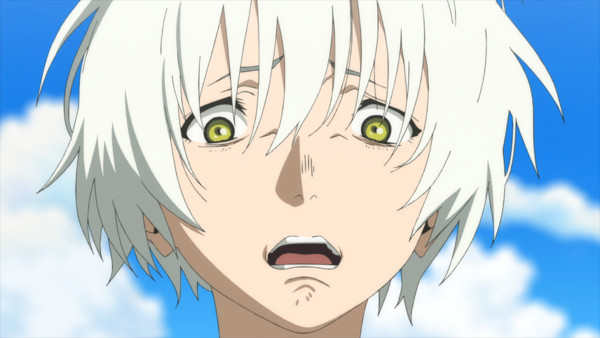
Alright, now we've reached the “Pour One Out” section. The section where, because I refuse to watch garbage, I can only lament upon seeing a good show turn to utter mush; something I really wish wasn't so common. While I enjoyed the first cour if only to relive all those cathartic moments from the manga, the second half of To Your Eternity feels like a large dip. At first I thought it was me, and that maybe I wasn't in the right mood or something. But then the production just completely falls apart. The prison island arc and onwards is not only sluggishly paced compared to the previous arcs – you can also see the seams ripping apart as you watch it. The anime could never have lived up to Yoshitoki Ōima's incredible art (in fact, I find most anime adaptions have poor art compared to their manga nowadays), but many scenes in the back half start feeling a little stilted. There are so many weird panning shots that watching the show became a bit nauseating for me and it definitely took the impact out of many of the more action-heavy sequences. As this season was slow, I wasn't watching much and mostly spent time sorting through some of my backlog from previous seasons, but this ended up being about the only show I completely fell off the wagon no matter how many times I tried to get back on. Even other shows that had similar bugs I still ended up keeping up with and enjoying, but for some reason I couldn't do the same for TYE, a story I already know and love. For an adaptation of a story full of heartbreaking moments that started out so well, the fact that it still let me down might be the biggest tragedy.
discuss this in the forum (51 posts) |
this article has been modified since it was originally posted; see change history